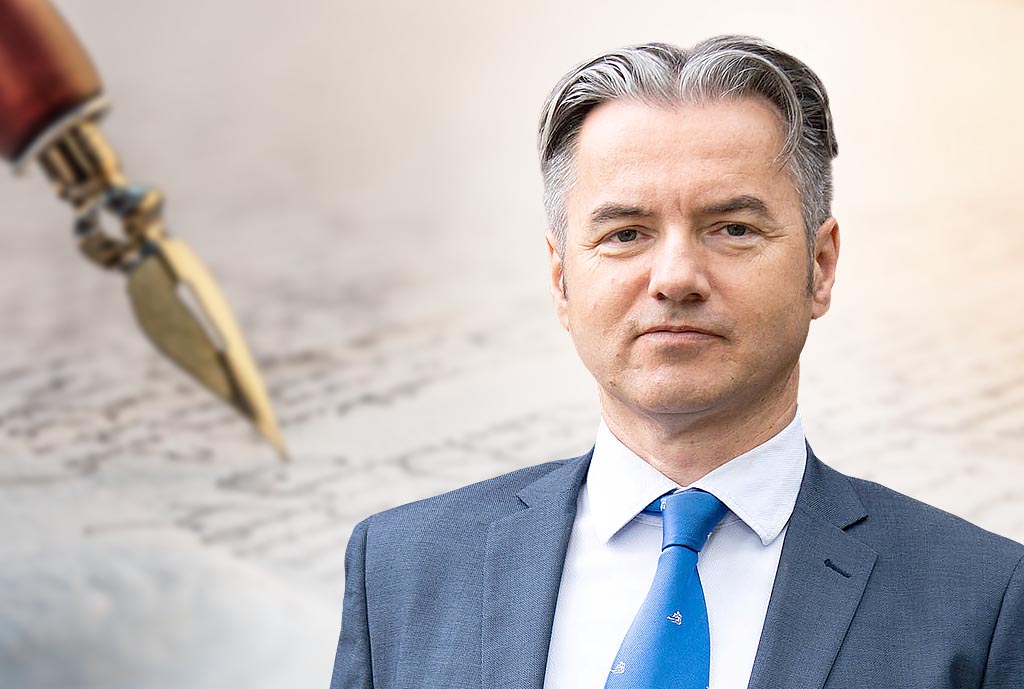By: Dr Metod Berlec
We have just celebrated the Feast of the Assumption of Mary, which was marked by attending holy masses and addresses by Slovenian bishops. As usual, the main mass in Slovenia took place in front of the Basilica of Mary Help of Christians in Brezje, attended by several thousand faithful. Just over two decades ago, the sermons delivered there on this occasion by the then Archbishop of Ljubljana, Franc Rode, were highly resonant. By offering very critical commentary on certain socio-political issues, he provoked a frenzy among the left-wing political and media scene. His current successor in this position, Stanislav Zore, is more reserved in this regard.
He mainly remains in the field of spiritual reflection and touches less on social issues. This time, he emphasised the importance of faith in contrast to atheism and the eternal search for oneself, that is, the growing secularisation of modern society. Zore stated: “Man also knows a different reality; he also knows the denial of God. He also knows the closing off to God’s will, or perhaps it is better to say: he wants to live without God, self-sufficient. In this arrogance, man wants to wrest the world from God’s hand. But as soon as man stopped listening to God and opened his heart to words that invited him to self-sufficiency, to arrogant pride, paradise disappeared. Man without God is naked and threatened. He is threatened by the creation around him and by the people around him.” According to him, today’s world does not want man to listen to God and fulfil His will: “With all kinds of rights, it places him in an open space of nothingness, where there are no longer directions and goals, where there are no longer paths and fulfilment, where only this moment remains, and man’s search for himself and his identity.” However, as Zore said, without God, who gives man dignity, man searches for his image day by day and repeatedly realises in disappointment that he does not know who he is. “Mary, the Assumed into Heaven, encourages us not to be concerned with the dragon and its theories, ideologies, laws, and everything else with which it wants to wrest man and the world from God’s hands. She encourages us to set our hearts on God.” /…/ “Our strength lies in trusting in God and living with God,” concluded the Archbishop of Ljubljana.
The recent Feast of the Assumption of Mary is thus an opportunity to reflect on Christianity, which is an integral part of our Slovenian and European identity. But also on the growing secularisation, which means the decreasing social significance of religion because of modernisation. In sociology, secularisation is a multifaceted concept that generally denotes “a transition from a religious to a more secular level”. The late German philosopher and historian Hans Blumenberg described the phenomenon as a long-term process that accelerates the disappearance of religious ties, the relationship to the transcendental, the expectation of life after death, and religious rituals in both private and public life. He described secularisation as the distancing of secular (religious, sacred) life from the secular. In our region, Christianity has been the most important religion throughout history. A severe blow to Christianity in Slovenia was dealt by communism. Of course, in the 21st century, this is a general phenomenon that is very much alive throughout the entire West. Therefore, the French philosopher Chantal Delsol, in her book The End of the Christian Civilisation, states that Western society is facing a true normative and philosophical reversal. The radical transformation of the Western world that we are witnessing testifies to the return of the pagan world and the emergence of new dogmas and new religions, such as ecology. The process of the disappearance of Christianity is “essentially violent and happens deliberately”. Therefore, according to her, Christianity must find a new way of existence. And that is “to be silent witnesses of God in the world.”
The French political philosopher Oliver Roy, in his book Is Europe Christian?, has a similar perspective. According to him, we are faced with a crisis of values and a crisis in the very reference to values. “If secularisation is the devil, the devil is everywhere; he has even disguised himself as religion, since secularisation is at the core of today’s religious processes. In disputes over normativity, the secular always wins, as does “secularity”, since religion can only prove or legitimise its values through example. And today, we cannot say that this exemplarity shines like a light on a hill.” Therefore, according to him, in matters of secular normativity, religious normativity, and identity, it is important to return to the question of values. We must return “to the foundations, especially to the foundations of European liberal society and the remnants of the Christian memory”. “We will have to return to the founding project of Europe and go beyond its bureaucratic normativity. Europe is the only body that we can still breathe some spirit into.” Of course, Christian, if not entirely in a religious sense, certainly at least in an identity sense…”
